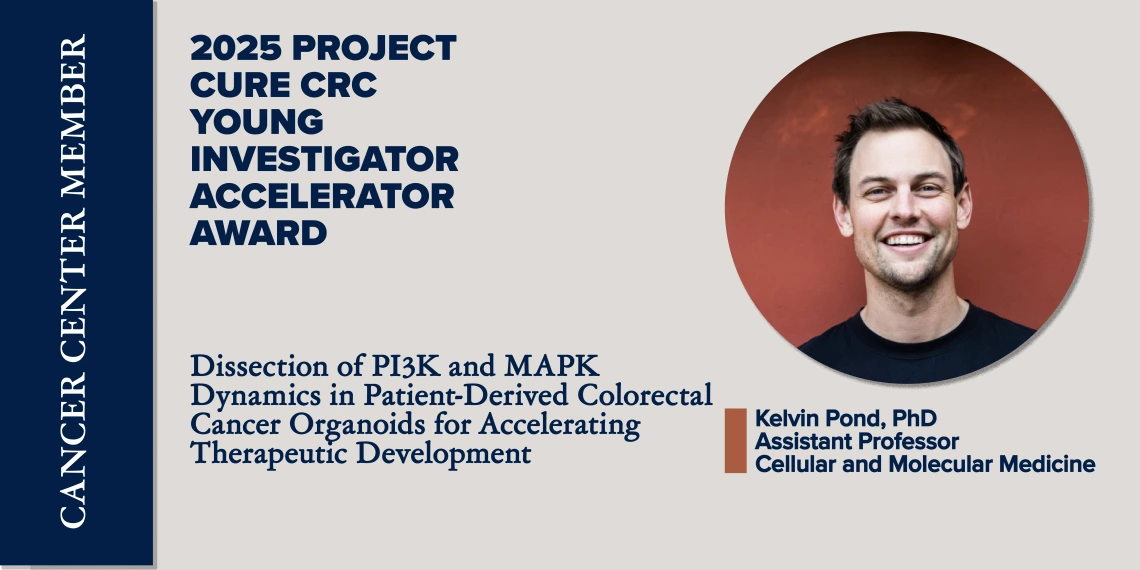Kelvin Pond’s study of the behavior of living human tumors earns him the 2025 Project Cure CRC Young Investigator Accelerator Award

From an early age, Kelvin Pond was drawn to understanding how cells, the subunits of life, work together to keep animals alive and thriving.
“I’ve always been fascinated by how cells make decisions; when to grow, divide, move, or stop,” said University of Arizona Comprehensive Cancer Center member Kelvin Pond, PhD, assistant professor of Cellular and Molecular Medicine.
Pond continued exploring cells in their natural habitat until graduate school, when he began examining how cancer hijacks those same cell decisions to grow, divide or stop in complex and clever ways.
“The more I learned, the more I wanted to understand how we could get those cell signals back under control,” Pond said. “That curiosity naturally led me to colorectal cancer, which is common but also incredibly diverse and hard to treat.”
Pond recently received the 2025 Project Cure CRC Young Investigator Accelerator Award from the Colorectal Cancer Alliance. The total grant of $188,000 supports his project titled, “Dissection of PI3K and MAPK Dynamics in Patient-Derived Colorectal Cancer Organoids for Accelerating Therapeutic Development.”
“Project Cure CRC really stands out because it directly supports translational research; that is, science that connects the lab bench to the bedside,” Pond said. “The award is designed to help researchers move promising ideas toward something that can truly help patients, and that’s exactly where our project lives. Having support from an organization so focused on patient-centered progress means a lot.”
Finding his way to cancer discovery
Pond completed his doctoral studies in cellular and molecular medicine, with a focus on DNA damage and repair in human cancers. He earned a master’s degree in biochemistry in toxicology studying mutagenesis of cells exposed to UV and uranium compounds from Northen Arizona University after receiving a bachelor’s degree in molecular biology from the University of Oregon.
Pond finds that one of the most fascinating and frustrating parts of cancer is that when researchers block one pathway, tumors often compensate by activating another.
“These pathways are not always hardwired by mutated genes as we once thought—they’re more like adaptive circuits that the cancer can switch on or off depending on the threat, making them reversible and harder to predict,” Pond said.
This process is often called non-genetic plasticity or signaling rewiring. Not all cancer cells can perform signaling rewiring; in colon cancer, a small subset of “cancer stem cells” are more flexible, resistant, and likely to cause relapse.
“Our goal is to define how these surviving cells persist and whether their compensatory pathways are predictable,” Pond said.
Working through collaboration
Pond and his team study tumors using living human biopsy models called patient-derived organoids. These are like miniature versions of a patient’s tumor grown in the lab. Historically, research has relied on cell cultures or small sample sizes of more advanced models, limiting researchers’ ability to capture the complexity and heterogeneity of colorectal cancer tumors.
“Using our unique patient-derived organoid model, we can now scale and quantify responses across diverse tumors, providing unprecedented insight into these dynamics,” Pond said.
Pond’s lab includes graduate student Lauren Riede, who has been instrumental in building and imaging these organoid models to help predict patient response. The team is collaborating with a newly recruited biomedical engineer, Swarna Ganesh, an assistant professor of biomedical engineering at the U of A College of Engineering, to study hundreds of types of nanoparticle-based delivery strategies to help combat the toxicity of current standard of care treatments.
In his current project funded through CRC, Pond and his team use organoid models to understand two major cell signals, called the PI3K and MAPK signaling pathways, that drive tumor growth in most colon cancers.
“These pathways are often activated in colorectal cancer, and they work together in tricky ways that allow tumors to resist treatment,” Pond said.
Being able to perform hundreds of “ex vivo” trials in a dish, Pond and his team can rapidly refine novel treatment strategies without risking patient safety. They can monitor survival pathways in real time to measure the duration and timing of these vulnerable states across tumors with different driver mutations.
“This approach will allow us to identify the pathways most critical to tumor survival after treatment and develop strategies to target resistant cells more effectively,” he said. “Ultimately, we aim to transform treatment timing strategies and improve outcomes for colorectal cancer patients, with the potential to significantly advance the goal of a cure.”
Pond believes that behind every sample studied by his team is a person waiting for better answers.
”We hope to eventually help patients get the best chance possible,” Pond said. “I’ve lost loved ones to cancer; I’ve seen how unpredictable and unforgiving treatment can be. If our work can help reduce just a little of that uncertainty for future patients, it’s worth every hour in the lab.”



